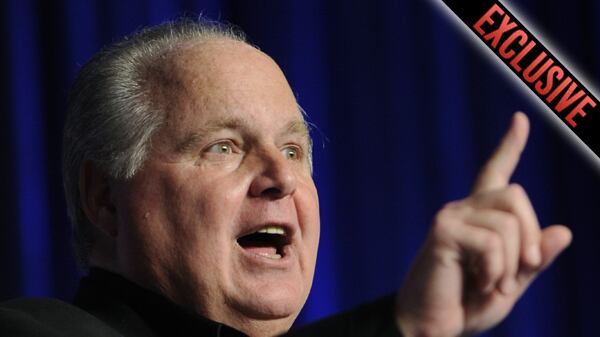The storm over Rush Limbaugh hasn’t completely abated, but he appears to have weathered the worst.
While Limbaugh’s detractors are still pushing an advertising boycott, he has started speaking of the effort as a failure.
“The opposition has been consistently dishonest in what they say about me,” Limbaugh told The Daily Beast. “So it’s no surprise they would be dishonest in their impact on my business.”
After apologizing for his blunder in calling Georgetown law student Sandra Fluke a “slut” and “prostitute,” Limbaugh is said to be energized by the furor, feeling that his opposition is now seen as wanting to shut him down rather than debate the issues.
Liberal critics quickly mounted an extensive campaign to pressure companies to stop advertising on his radio show. And it’s had an undeniable impact, with more than 140 companies either withdrawing their ads or asking that their spots not be used during Limbaugh’s time slot (although some were not regular Rush advertisers to begin with). Someone familiar with the program’s finances says the percentage drop for revenue flowing to the national program has been in the single digits.
Limbaugh told listeners this week that “our ratings are up anywhere from 10 percent to 60 percent, depending on the station,” and that “the advertisers who hung in here are going gangbusters, yes...The only ones who got hurt are the ones who left. And that’s its own tragedy because they left under false, trumped up, unreal pretenses.” The latest ratings information will not be made public for some time.

Even the advocacy group Media Matters, which is leading the boycott campaign, concedes the effort has peaked. Angelo Carusone, who heads the campaign for Media Matters, told The Washington Post, “I think certainly the pressure has been reduced. To a certain extent, that’s OK and acceptable...Obviously, the intensity is gone, but the engagement remains high.”
What’s more, although two stations dropped the Rush program when the controversy exploded, none of the other 600-plus stations that carry him have followed suit.
But Limbaugh is not declaring victory quite yet, and the reason has to do with the complicated ways that ads are sold for his program.
A percentage of the available time is sold for national advertising and flows to Premiere Networks, Limbaugh’s distributor. But much of the time is sold by individual stations to local companies, and these stations keep all the revenue in exchange for paying a fee to air the program.
These local advertisers are the most vulnerable because boycott advocates descend on them in waves, describing Limbaugh as misogynist in phone messages and on their Facebook pages and Twitter feeds. Under that kind of pressure, some companies have decided it is better to defuse the controversy by yanking their spots.
On Monday, the kitchen and bathroom fixture company Kohler tweeted: “Thank you for your concern. We do not support the comments of Mr. Limbaugh and have pulled our advertising from his show.”
Limbaugh, 61, compounded the damage by attacking Fluke for three days after she testified one month ago on Capitol Hill in favor of requiring institutions such as Georgetown to offer insurance that covers birth control. She began fighting back with television appearances, and he apologized after a number of advertisers withdrew their support.
Whatever financial hit Limbaugh has taken, the episode has not eroded his status as the most popular host in conservative talk radio—and one of the left’s biggest targets. If he is right about the ratings, the uproar may have prompted more listeners to find out what the fuss was about.






